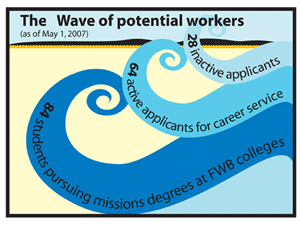 |
BOTTLENECKS, TRAFFIC JAMS,
AND DETOURS
Overwhelmed by the Coming Wave of Volunteers
by James Forlines
Watch the Video as James Forlines describes his vision for Free Will Baptist International Missions at the National Convention in Little Rock. For more information about Free Will Baptists International Missions, visit www.fwbgo.com. |
Overwhelmed!
Have you ever felt overwhelmed? Have you observed a system overwhelmed and no longer adequate to meet the needs for which it was intended?
Just after I moved to Nashville, I became an unwilling participant in this phenomenon. While living south of the city, I often needed to travel north on I-65. Unfortunately, so did thousands of other motorists. And Harding Bridge, our access to I-65, was not prepared for the heavy traffic.
The four-lane bridge was a blessing when it was first built, but now it was a chokepoint. The inadequacies of the bridge caused long delays and a lot of frustration. Growth in the area had far exceeded the bridge’s capacity. Even though many people contrived alternate routes, the problem was not solved until the bridge was restructured.
Free Will Baptist growth around the world parallels my Harding Bridge experience. We have more candidates preparing for career missionary service than ever. This “wave” of people has sensed—and is responding to—God’s call to go to the unreached. By 2011, many of the 64 candidates actively pursuing career missionary status can expect to be appointed.

“The Wave” also includes 84 students in our Free Will Baptist colleges studying missions. An additional 28 applicants (inactive because of health, financial, or other reasons) may rejoin the process when circumstances change. We haven’t included the many second-career people who will respond to God’s call to go (presently, 14% of our career missionary force). With more than 100 high school and college students serving abroad each year on short-term teams, the flow is likely to gain momentum for years to come.
In the next three to five years, if we do not miss this opportunity, when the wave hits foreign shores it will impact new areas, new countries, and new ministries, planting new churches. The potential for immense international expanse is right before our eyes.
As Free Will Baptists, we do have an incredible potential, unprecedented in our history, to shine His Light and declare His Truth among the unreached around the world. Our growth internationally, our partnership with Free Will Baptist national churches around the world, and the call of God creating a “wave” of candidates, all beg us not to miss this moment.
 How can we possibly miss this moment? How can we possibly miss this moment?
We can fail to replace a bridge (our funding system) that is no longer adequate for the heavy traffic it is receiving. At the National Association in July, I presented this as the one historic challenge currently facing us as it relates to world evangelism.
We have a very complicated system of supporting international missionaries. Eleven states, recognizing and seeking to alleviate the problem, provided detours, devising their own plans to support missionaries from their states. Each of these varies in the percentage of a missionary’s budget it covers. Some adjust monthly allocations depending on income from other sources, including other state plans. Some missionaries have fared well under their state plan. It has eased a huge burden and been a real blessing. For this, we are thankful and praise God.
However, some states, with many missionaries and few churches, are finding themselves overwhelmed. Many candidates are from areas without a state plan. Most missionaries from states without a plan, or from a state with many missionaries and few churches, face an incredible challenge—how to get funded and to the field. Alternate routes for funding are limited. It is very complicated.
Before state plans, all missionaries traveled and raised cash and monthly support. This also has its challenges: principally a brutal travel schedule during furlough. One state plan development committee discovered, under the designated giving system, missionaries from their state received funding from an average of 15 states and 120 churches!
This support base is incredibly difficult, and expensive, to develop and sustain. True partnerships cannot be maintained with this many churches. At best, missionaries drop in for a service every four to eight years, give a report, and move on to the next church. People from across the denomination have rightly expressed concern for missionaries’ extensive travel demands.
If the current system is challenging to veteran missionaries (and it is), it is almost impossible to maneuver for new appointees. Recent experience demonstrates new missionaries spend as much as two and one-half years raising their support.
For the past few years the Board has focused on seeking God’s direction for our Mission in this challenging time. Like the planners trying to resolve the Harding Bridge dilemma, our Board has been responsibly seeking a solution. In December of 2005, the Board, staff, and regional directors met for a strategic retreat. The need to restructure the funding system was identified as the Mission’s number one strategic priority for the next five years. The Board charged the staff to research and develop an initial plan. In April 2007, the Board unanimously voted to adopt a preliminary plan and timeline for changing the funding system.
Such a monumental change requires godly wisdom. Prayerful consideration led the Board to take a year to seek as much counsel as possible before finalizing any plan. Since April, many meetings with missionaries, pastors, state leaders, and other FWB people have been conducted to listen to their suggestions and concerns.
Yes, plans are on the drawing board. A scale model is under construction. As more input is received, the plans and model may change.
What is the current thinking of the Board?
There are two main sections in a missionary’s budget: the cost for missionaries just to be on the field and the cost of field ministry.
The first section—costs for missionaries to be on the field—includes salary, insurances, retirement, housing, children’s education, etc. It is suggested we establish a fund to underwrite all of the personal costs of all our missionaries. This fund also covers the needs on fields with little or no missionary presence, and all stateside costs. We, as a denomination, take the responsibility to get missionaries to the nations and keep them there.
The second section—costs for missionaries to do ministry on the field—includes such things as national workers, rental of meeting facilities, Bible institutes, evangelistic campaigns, humanitarian projects, and other ministry endeavors. In the current thinking, missionaries raise these funds by establishing a limited number of “partners.” Churches or associations partner with the missionary to underwrite ministry for the missionary’s term.
A number of people have suggested a 100% fund to underwrite everything (such as Southern Baptists do). We believe relationships and partnerships with local churches and district associations are critical and, perhaps, one of the few strengths of our current system. We do not want to lose those
Questions still need to be asked. Details still have to be worked through. The Board realizes this will take time. A timeline requires a fully developed plan be presented to the Board for approval in April 2008, allowing a full year to work out the details. Education throughout the denomination will be necessary before the road can be opened for traffic. We hope to have a fully functioning bridge (restructured funding system) in place by January 1, 2010, or, possibly, 2011.
In some ways, it is easier to do nothing. But, like the planners who faced the challenge of easing the bottleneck on Harding Bridge, we know our current system is inadequate to support the growth we believe God is providing. We must act strategically, courageously, and, most of all, together.
I ask you to pray and give feedback, so we can all work together to reach the ends of the earth.
James Forlines began his tenure as general director of Free Will
Baptist International Mission on
Jannuary 1, 1999.
WATCH THE VIDEO
James Forlines gave more details of the restructuring system during his report at the 2007 National Association in Little Rock, AR. A video of his full report is available online (www.fwbgo.com).
|

